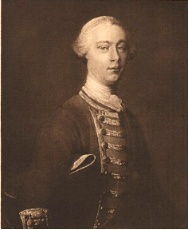 James Wolfe, born January
2, 1727, Westerham, Kent, died September 13, 1759, Quebec City, Quebec.
The son of Edward Wolfe, British Army officer and Henrietta Thompson, he
joined his father's regiment at 13 years of age and was actively involved
in the Battle of Dettingen at age 16.
James Wolfe, born January
2, 1727, Westerham, Kent, died September 13, 1759, Quebec City, Quebec.
The son of Edward Wolfe, British Army officer and Henrietta Thompson, he
joined his father's regiment at 13 years of age and was actively involved
in the Battle of Dettingen at age 16.
At the age of sixteen, James became a Lieutenant. At 17 he was made a captain. In 1745 he was sent to Scotland to deal with rebellion problems there. He served Scotland and England from until 1758 when he was sent to North America to aid in the capture of Louisbourg and the following year, the capture of Quebec City.
Wolfe was quiet and modest, a refined gentleman and well educated. When on furlough from fighting between 1750 and 1758, Wolfe traveled to France to perfect his use of the French language. His knowledge of this language would prove beneficial in the capture of Quebec City in September 1759.
Wolfe also wrote military pamphlets. In 1755 he wrote one entitled, "Instructions for the guidance of the 20th Foot should the French effect a landing."
He took care of his troops and was loved by them, yet he was a stern disciplinarian. His health was not good and often suffered from rheumatism and other health-related problems. Although James Wolfe suffered from debilitating illness, his enthusiasm, stamina, loyalty and passion for victory make him stand out from his peers. Wolfe was commissioned as a major general on January 12, 1759. The rank was classed as "temporary" to appease those senior officers that were older than James Wolfe and had served more years, but had not attained that classification. His appointment as Major General was merited, unlike many others in the English army.
The bestowing of major general on Wolfe came as a shock to many in the military, however the people of England highly approved of his selection. He is said to have had "an indubitable spirit, a profound mind, quick intuition, a charming manner, and was much thought of by women" (Thwaites, 242). These attributes, along with his military successes, endeared him to the British.
A story is told of the English Court labeled Wolfe as "mad". King George II declared, "Mad, is he? Then I hope he will bite some of my other generals!" (Historical Biographies, paragraph 9).
The Seven Years War (1756 - 1763) in North America would bring about the pinnacle of Wolfe's military career. This war would make him a hero - one battle (Louisbourg) brought him glory, his last one (Quebec) brought his death.